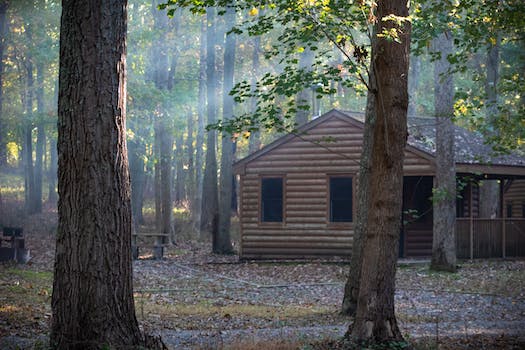How To Live Cheap Off The Grid
“Living off the grid doesn’t have to break the bank – discover how to live cheaply and sustainably.”
Introduction
Living off the grid can be a great way to save money and reduce your environmental impact. However, it can also be a challenging lifestyle that requires careful planning and preparation. In this article, we will provide some tips and strategies for living cheaply off the grid, including how to reduce your energy consumption, grow your own food, and find affordable housing options. Whether you are looking to live off the grid full-time or just want to reduce your reliance on traditional utilities, these tips can help you save money and live a more sustainable lifestyle.
10 Tips for Living Off The Grid on a Tight Budget
Living off the grid can be a great way to save money and live a more sustainable lifestyle. However, it can also be challenging to make ends meet when you’re living in a remote location without access to modern conveniences. If you’re looking to live cheap off the grid, here are ten tips to help you make the most of your resources.
1. Start with a budget
The first step to living cheap off the grid is to create a budget. This will help you keep track of your expenses and make sure you’re not overspending. Be sure to include all of your monthly expenses, such as food, utilities, and any other bills you may have.
2. Grow your own food
One of the best ways to save money off the grid is to grow your own food. This can be done in a garden or greenhouse, and can provide you with fresh produce all year round. You can also raise chickens or other livestock for meat and eggs.
3. Use renewable energy sources
Using renewable energy sources like solar or wind power can help you save money on your energy bills. While the initial investment may be high, the long-term savings can be significant.
4. Reduce your water usage
Water is a precious resource when you’re living off the grid, so it’s important to conserve as much as possible. This can be done by installing low-flow toilets and showerheads, collecting rainwater, and using a composting toilet.
5. Use natural cleaning products
Instead of buying expensive cleaning products, try using natural alternatives like vinegar and baking soda. These are cheap and effective, and won’t harm the environment.
6. Make your own clothes
If you’re handy with a sewing machine, making your own clothes can be a great way to save money. You can also repurpose old clothes or buy second-hand items to save even more.
7. Use a wood stove for heating
A wood stove can be a great way to heat your home without relying on expensive electricity or propane. You can also use it for cooking and baking, which can save you money on your food bills.
8. Use a composting toilet
A composting toilet is a great way to save water and reduce your environmental impact. It works by breaking down human waste into compost, which can be used to fertilize your garden.
9. Use a rainwater collection system
Collecting rainwater can be a great way to save money on your water bills. You can use it for watering your garden, doing laundry, and even for drinking if you have a filtration system in place.
10. Learn to DIY
Learning to do things yourself can be a great way to save money off the grid. Whether it’s fixing a leaky faucet or building a chicken coop, there are plenty of resources available online to help you learn new skills.
Living off the grid can be a challenging but rewarding experience. By following these tips, you can live cheaply and sustainably while enjoying the freedom and independence that comes with living off the grid.
Frugal Living: How to Cut Costs and Live Off The Grid

Living off the grid can be a great way to save money and live a more sustainable lifestyle. However, it can also be a challenge to adjust to a new way of living. Here are some tips on how to live cheap off the grid.
First, it’s important to understand what living off the grid means. Essentially, it means living without access to public utilities like electricity, water, and gas. This can be done in a variety of ways, such as using solar panels for electricity, collecting rainwater for drinking and washing, and using wood or propane for cooking and heating.
One of the biggest benefits of living off the grid is that it can save you a lot of money. By not relying on public utilities, you can avoid monthly bills and save money in the long run. However, there are also some upfront costs associated with setting up your off-grid system. Solar panels, for example, can be expensive to install, but they can pay for themselves over time.
Another way to save money when living off the grid is to grow your own food. This can be done in a variety of ways, such as planting a garden or raising chickens for eggs and meat. By growing your own food, you can save money on groceries and also have the satisfaction of knowing where your food comes from.
When it comes to heating and cooling your home, there are a few options to consider. Wood stoves are a popular choice for off-grid living, as they can provide heat and also be used for cooking. However, they do require a steady supply of firewood, which can be a challenge to obtain. Propane heaters are another option, but they can be expensive to run. Some off-gridders also use passive solar heating, which involves designing your home to capture and store heat from the sun.
Water is another important consideration when living off the grid. Collecting rainwater is a popular option, but it’s important to make sure the water is safe to drink. You can also drill a well or use a spring for your water supply. It’s important to have a backup plan in case your water supply runs low or becomes contaminated.
Living off the grid can also mean making some lifestyle changes. For example, you may need to adjust your daily routines to accommodate for the limited resources available. You may also need to learn new skills, such as how to repair your own equipment or how to preserve food without a refrigerator.
Overall, living off the grid can be a rewarding and cost-effective way to live. However, it’s important to do your research and plan ahead before making the switch. By understanding the challenges and benefits of off-grid living, you can make an informed decision about whether it’s right for you.
DIY Off-Grid Living: Ways to Save Money and Live Sustainably
Living off the grid can be a great way to save money and live sustainably. However, it can also be a challenge to make ends meet without the conveniences of modern life. Here are some tips on how to live cheaply off the grid.
First, it’s important to reduce your energy consumption. This can be done by using energy-efficient appliances, such as LED light bulbs and low-flow showerheads. You can also install solar panels or wind turbines to generate your own electricity. Another way to save energy is to use natural light as much as possible, by opening curtains and blinds during the day.
Next, you can save money on food by growing your own vegetables and fruits. This can be done in a garden or greenhouse, or even in containers on a balcony or patio. You can also raise chickens or other livestock for eggs and meat. By growing your own food, you can save money on groceries and reduce your carbon footprint by avoiding the transportation of food from far away.
Another way to save money is to reduce your water usage. This can be done by installing low-flow toilets and faucets, and by collecting rainwater for use in the garden. You can also take shorter showers and turn off the water while brushing your teeth. By reducing your water usage, you can save money on your water bill and conserve this precious resource.
When it comes to heating and cooling your home, there are several ways to save money. One option is to use a wood stove or fireplace for heat, which can be fueled by wood from your own property. You can also use passive solar heating by positioning your home to take advantage of the sun’s warmth. In the summer, you can use natural ventilation to cool your home, by opening windows and using fans instead of air conditioning.
Finally, it’s important to reduce your waste and recycle as much as possible. This can be done by composting food scraps and yard waste, and by using reusable containers instead of disposable ones. You can also recycle paper, plastic, glass, and metal, and donate or sell items that you no longer need. By reducing your waste, you can save money on garbage disposal fees and help protect the environment.
Living off the grid can be a rewarding and fulfilling way of life, but it does require some adjustments and sacrifices. By following these tips, you can save money and live sustainably while enjoying the freedom and independence of living off the grid. Remember to be patient and persistent, and to seek out support and advice from others who are also living off the grid. With determination and creativity, you can create a life that is both affordable and fulfilling.
Minimalist Living: How to Live Cheaply and Comfortably Off The Grid
Living off the grid is a lifestyle that has become increasingly popular in recent years. It involves living without the use of public utilities such as electricity, water, and gas. Instead, people who live off the grid rely on renewable energy sources such as solar panels, wind turbines, and hydroelectric power. Living off the grid can be a great way to save money and reduce your carbon footprint. Here are some tips on how to live cheaply and comfortably off the grid.
Firstly, it is important to find a suitable location. Living off the grid requires a lot of space, so it is important to find a location that is large enough to accommodate your needs. You will need to find a location that has access to water, either through a well or a nearby stream. You will also need to find a location that has access to sunlight, as this will be your primary source of energy.
Once you have found a suitable location, it is time to start building your off-grid home. There are many different types of off-grid homes, from tiny houses to earthships. The type of home you choose will depend on your budget and your personal preferences. It is important to choose a home that is energy-efficient and sustainable, as this will help you save money in the long run.
When it comes to energy, solar panels are the most popular choice for off-grid living. Solar panels are a great way to generate electricity without relying on public utilities. They are also relatively easy to install and maintain. Wind turbines and hydroelectric power are also viable options, but they require more space and maintenance.
Water is another important consideration when living off the grid. You will need to find a source of water, either through a well or a nearby stream. It is important to have a reliable source of water, as this will be your primary source of drinking water and water for cooking and cleaning. You will also need to install a water filtration system to ensure that your water is safe to drink.
Food is another important consideration when living off the grid. You will need to grow your own food or find a local source of food. Growing your own food can be a great way to save money and reduce your carbon footprint. You can also raise livestock such as chickens, goats, and cows for meat and dairy products.
Living off the grid can be a great way to save money and reduce your carbon footprint. However, it is important to be prepared for the challenges that come with this lifestyle. Living off the grid requires a lot of hard work and dedication. You will need to be self-sufficient and resourceful, as you will not have access to public utilities.
In conclusion, living off the grid can be a great way to save money and reduce your carbon footprint. It requires a lot of hard work and dedication, but it can be a rewarding lifestyle. If you are considering living off the grid, it is important to find a suitable location, build an energy-efficient home, find a reliable source of water, and grow your own food. With the right preparation and dedication, you can live cheaply and comfortably off the grid.
Sustainable Living on a Shoestring Budget: How to Live Off The Grid Without Breaking the Bank
Living off the grid is a dream for many people who want to live a sustainable lifestyle. However, the idea of living off the grid can be daunting, especially when it comes to the cost. But, living off the grid doesn’t have to break the bank. In this article, we will discuss how to live cheap off the grid.
Firstly, it’s important to understand what living off the grid means. Living off the grid means living without the support of public utilities such as electricity, water, and gas. Instead, you generate your own power, collect your own water, and use alternative methods for heating and cooking. This lifestyle can be incredibly rewarding, but it requires a lot of planning and preparation.
One of the most significant expenses when it comes to living off the grid is generating your own power. However, there are many ways to generate power without breaking the bank. Solar panels are a popular option for generating electricity. They are relatively inexpensive and can be installed on your property. Additionally, wind turbines can also be used to generate power. While they can be more expensive than solar panels, they can generate more power, making them a good investment in the long run.
Another way to save money when living off the grid is to collect your own water. Collecting rainwater is a great way to ensure that you have a constant supply of water. You can install a rainwater collection system on your property, which can be used for drinking, cooking, and cleaning. Additionally, you can also dig a well on your property, which can provide you with a reliable source of water.
When it comes to heating and cooking, there are many alternative methods that can be used. Wood stoves are a popular option for heating and cooking. They are relatively inexpensive and can be used to heat your home and cook your food. Additionally, propane stoves can also be used for cooking. While propane can be more expensive than wood, it is still a cost-effective option when compared to traditional gas stoves.
Living off the grid also means being self-sufficient. This means growing your own food and raising your own animals. Growing your own food can be a great way to save money and ensure that you are eating healthy, organic produce. Additionally, raising your own animals can provide you with a source of meat and dairy products.
Living off the grid can be a challenging lifestyle, but it can also be incredibly rewarding. By generating your own power, collecting your own water, and being self-sufficient, you can live a sustainable lifestyle without breaking the bank. It’s important to remember that living off the grid requires a lot of planning and preparation. However, with the right mindset and a little bit of hard work, anyone can live cheap off the grid.
Conclusion
Living off the grid can be a great way to save money and live a more sustainable lifestyle. By reducing your reliance on traditional utilities and finding ways to generate your own power and grow your own food, you can significantly reduce your monthly expenses. Some key strategies for living cheaply off the grid include investing in solar panels or other renewable energy sources, using rainwater harvesting systems, and growing your own food. With a little bit of planning and effort, it is possible to live a comfortable and fulfilling life off the grid without breaking the bank.




